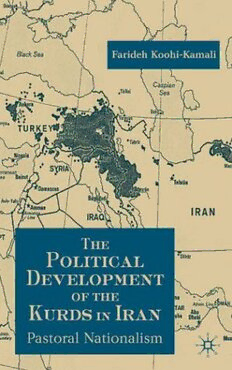
The Political Development of the Kurds in Iran: Pastoral Nationalism PDF
265 Pages·2004·1.126 MB·English
Most books are stored in the elastic cloud where traffic is expensive. For this reason, we have a limit on daily download.
Preview The Political Development of the Kurds in Iran: Pastoral Nationalism
Description:
The Political Development of the Kurds in Iran examines the links between the structural changes in the Kurdish economy, and its political demands, namely Kurdish nationalism in Iran. Farideh Koohi-Kamali argues that the transition of the nomadic, tribal society of Kurdistan to an agrarian, village society was the beginning of a process, whereby Kurds see themselves as a community with a homogeneous ethnic identity. She interrogates the political movements of the Kurds in Iran to argue that the different phases of economic development of Kurdish society played a great role in determining the ways Kurds expressed their political demands for independence. The significant contribution of this book is in the analysis of rare data, where the author examines a number of economic and demographic factors which contributed to: the distingeration of the nomadic, tribal society of Kurdistan (change); the cohesion and solidarity within Kurdistan (continuity); and those indicators of inequality between Kurdistan and Iran as the final precondition of the development of a unified nationalist consciousness/identity amongst the Kurds.
See more
The list of books you might like
Most books are stored in the elastic cloud where traffic is expensive. For this reason, we have a limit on daily download.
